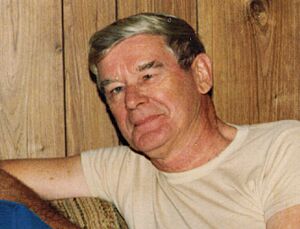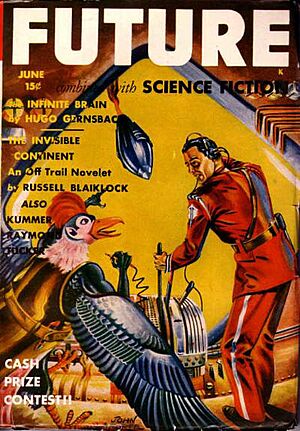Wilson Tucker (writer) facts for kids
Quick facts for kids
Wilson Tucker
|
|
|---|---|
 |
|
| Born | Arthur Wilson Tucker November 23, 1914 Deer Creek, Illinois, U.S. |
| Died | October 6, 2006 (aged 91) St. Petersburg, Florida, U.S. |
| Pen name | Bob Tucker, Hoy Ping Pong |
| Occupation | Writer |
| Period | 1932–2006 (as fan) |
| Genre | Science fiction, mystery |
| Notable works |
|
Arthur Wilson "Bob" Tucker (born November 23, 1914 – died October 6, 2006) was an American author. He became famous for writing mystery, action, and science fiction stories. He used the name Wilson Tucker for his professional writing.
Tucker was also a very important part of the science fiction fandom. This is a community of people who love science fiction. He wrote a lot for fan magazines, called fanzines, using the name Bob Tucker. This was a family nickname he had since he was a child. He was known for being a smart critic of science fiction. He even created terms like "space opera", which is still used today.
Contents
Wilson Tucker's Life Story
Wilson Tucker was born in Deer Creek, Illinois. For most of his life, he lived in Bloomington, Illinois. He was married twice and had children. His second marriage to Fern Delores Brooks lasted 52 years.
How Wilson Tucker Joined Fandom
Tucker became involved in science fiction fandom in 1932. He started his own fanzine called The Planetoid. A fanzine is a magazine made by fans for fans. From 1938 to 2001, he published another fanzine called Le Zombie. This fanzine had over 60 issues! It was even brought back later as a website magazine. The name Le Zombie came about because people often mistakenly reported that he had died.
He also published the Bloomington News Letter. This fanzine shared news about professional science fiction writers. Tucker was very popular among fans for over 60 years. He created many words and phrases that are still used in science fiction fandom and criticism. Besides "Bob Tucker," he sometimes wrote funny pieces under the name "Hoy Ping Pong."
For 41 years, from 1955 to 1996, Tucker wrote and edited eight versions of The Neo-Fan's Guide To Science Fiction Fandom. This guide looked back at the first 50 years of science fiction fandom. It included important events and trends. Each edition also had a list of fan words used at the time.
People described Tucker's fanzine writing as "always sharp and clear." They also called him "the most intelligent and sophisticated fan" in American science fiction. He helped start the way people criticize and analyze science fiction. He even created terms like "space opera" that we use every day.
Wilson Tucker at Science Fiction Conventions
Tucker was a special guest or host at many science fiction conventions. These are big gatherings for science fiction fans. He attended so many over almost 70 years that no one has a full list. Some important appearances include being a guest of honor at Torcon I in 1948 and NyCon3 in 1967. He was also a regular host at Midwestcon and LibertyCon. He hosted MidAmeriCon, the 1976 Worldcon.
In 1940, he helped organize the Worldcon in Chicago. In 2001, he co-hosted a joint convention in his hometown of Bloomington, Illinois.
Awards and Honors for Wilson Tucker
Tucker won the Hugo Award for Best Fan Writer in 1970. He also won a special "Retro-Hugo" award in 2004 for his fan writing in 1954. His Science Fiction Newsletter (also known as Bloomington News Letter) won a Retro-Hugo for Best Fanzine for 1951. His fanzine Le Zombie also won a Retro-Hugo for Best Fanzine for 1943.
In 2003, the Science Fiction and Fantasy Hall of Fame welcomed Tucker. Other awards he received include the 1986 Skylark Award. He was named Author Emeritus by the Science Fiction Writers of America in 1996. He also received the First Fandom Hall of Fame Award.
A science fiction convention called Tuckercon in 2007 was named in his honor.
Wilson Tucker's Professional Career
Even though he sold over 20 novels, Tucker mainly earned his living as a movie projectionist. He also worked as a theater electrician. He started as a prop man at the Majestic Theater in Bloomington, Illinois. He became the President of Local 193 of the International Alliance of Theatrical Stage Employees (IATSE). He retired as a projectionist in 1972.
Wilson Tucker's Professional Writing
In 1941, Tucker's first professional short story was published. It was called "Interstellar Way Station." It appeared in Super Science Stories magazine. Between 1941 and 1979, he wrote about two dozen more short stories. He also wrote many novels, including 11 mystery novels and 12 science fiction novels.
His most famous novel is likely The Year of the Quiet Sun (1970). This book was a runner-up for the Locus Award. It was also a finalist for the Hugo and Nebula Award. In 1976, it won a special John W. Campbell Memorial Award.
Another important novel is The Lincoln Hunters (1958). In this story, people from a difficult future travel back in time. They want to record Abraham Lincoln's "lost speech" from 1856. The book gives a clear picture of Lincoln and his time. It shows how a person from the future sees Lincoln's era as much better than their own.
The Long Loud Silence (1952) is a story about a world after a disaster. The eastern part of the United States is blocked off after an atomic and germ attack. Another writer, Damon Knight, called it "a phenomenally good book." He said it was almost perfect.
Many of Tucker's short stories were put together in a book called The Best of Wilson Tucker (1982).
Tucker often used the names of his friends for small characters in his stories. This led to a special literary term called "tuckerization". For example, he named a character after Lee Hoffman in The Long Loud Silence. He also named characters after Robert Bloch in The Lincoln Hunters and Walt Willis in Wild Talent.
Selected Works by Wilson Tucker
Novels
- Charles Home mysteries (five books, 1946 to 1951)
- The Chinese Doll (1946)
- The City in the Sea (1951)
- The Long Loud Silence (1952)
- The Time Masters (1953, updated 1971)
- Wild Talent (1954) (also known as Man from Tomorrow, 1955)
- Time: X (1955)
- Time Bomb (1955) (also known as Tomorrow Plus X)
- The Lincoln Hunters (1958)
- To the Tombaugh Station (1960)
- A Procession of the Damned (1965)
- The Year of the Quiet Sun (1970)
- This Witch (1971)
- Ice and Iron (1974)
- Resurrection Days (1981)
Stories
- The Princess of Detroit, Future Science Fiction (June 1942)
- The Planet King (1959)
- The Best of Wilson Tucker (Timescape, 1982) (a collection of stories)
Nonfiction
- The Neo-Fan's Guide To Science Fiction Fandom (eight editions, 1955 to 1996)
See also
 In Spanish: Wilson Tucker para niños
In Spanish: Wilson Tucker para niños
- Tuckerization


